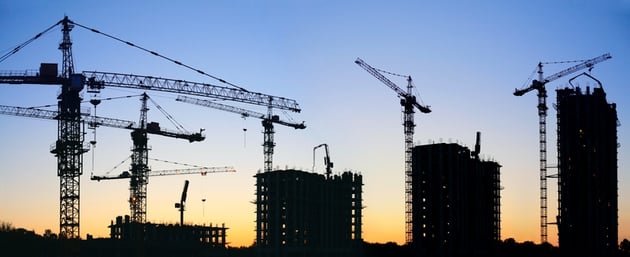Four Places the Building Business is Booming
One of the big stories throughout construction over the last few years has been the revitalization of the industry. Whether it’s infrastructure or commercial and residential building, the construction sector is trending up. As states and cities need to improve their roads and bridges, create housing and shopping for their residents, as well as create services such as hospitals and schools for a growing population, it looks as if the industry should continue to see growth. Here’s a look at four of the hottest markets in construction and what’s driving business in those markets.

Start spreading the news…New York City is a building boom town. With over $46 billion in new construction starts, all sectors of the construction industry are benefiting from the incredible growth happening in and around the Big Apple. Residential starts increased by 41%, boosted by an increase in foreign investment and tax breaks for projects that included affordable units. Non-residential starts jumped 48% with a considerable amount of the growth happening in the Hudson Yards, which is home to two billion-dollar office/retail tower projects.
The saying goes, "everything is bigger in Texas" , and that especially holds true for the construction industry. Leading the way in Texas’s construction boom was the Dallas Metro area with $17.8 billion in new construction starts. As Dallas’s population surges and its economy continues to grow, the housing market has gotten tighter and has driven an increase in both residential and mixed-use construction. Two-thirds of new construction spending in the greater metro area has been on new homes, and seven of the city’s twenty largest projects last year were mixed-use buildings and developments. Projects like Facebook’s billion-dollar data center are helping keep commercial development buzzing in Dallas.
While low oil prices have slowed the unbelievably fast growth of building in Houston, the city is still a construction powerhouse. With $16.7 billion in construction starts, the city is still trying to catch up on projects started during the oil boom while also creating new hotels, shopping centers, and restaurants to serve their booming population. Proving this is the fact that only 6% of Houston’s retail space is available, and only a quarter of the 2.6-million square feet currently under construction is available for rent. One of the largest and most notable projects is the remodeling of the 35-year-old San Jacinto Mall into an open-air shopping center. Service is driving building projects in Houston, but healthcare is also on the upswing with $5 billion in development either planned or in development.
The U.S.’s second-largest city, Los Angeles, continues its rapid growth with $11.7 billion in new construction starts. Driving L.A.’s growth is the both the rise in residential housing and numerous large-scale construction projects. With more than 10,000 residential units under construction in downtown Los Angeles alone, the need for residential housing is driving construction industry growth, and leading the way is the billion-dollar Metropolis project that will contain 38 stories of condos, in addition to the 350-room Hotel Indigo. While housing is huge, hotels and retail also are fueling the surge in projects, such as the construction of the Waldorf Astoria and the $561-million expansion and renovation of the Westfield Century City Mall.
 The current boom these cities are seeing in construction is great news for the industry. Not only does the increase in construction benefit workers, it also has a positive impact on engineers, architects, suppliers, truckers, and everyone else who has a role to play in the development process. In cities like New York, Dallas, Houston, and L.A., construction companies don’t have a moment to spare, and can’t afford downtime—which means that these busy businesses should look to our line of Galaxy construction tires. With a reputation for being rugged, these tires are also known for their low total cost of ownership (TCO), helping to keep machines moving, productivity up, and costs down.
The current boom these cities are seeing in construction is great news for the industry. Not only does the increase in construction benefit workers, it also has a positive impact on engineers, architects, suppliers, truckers, and everyone else who has a role to play in the development process. In cities like New York, Dallas, Houston, and L.A., construction companies don’t have a moment to spare, and can’t afford downtime—which means that these busy businesses should look to our line of Galaxy construction tires. With a reputation for being rugged, these tires are also known for their low total cost of ownership (TCO), helping to keep machines moving, productivity up, and costs down.

